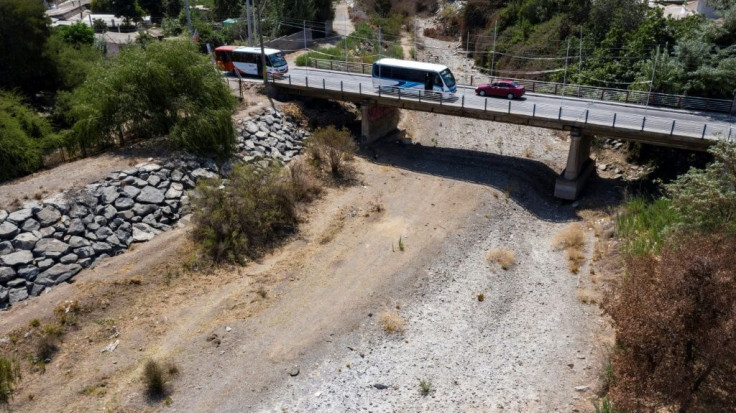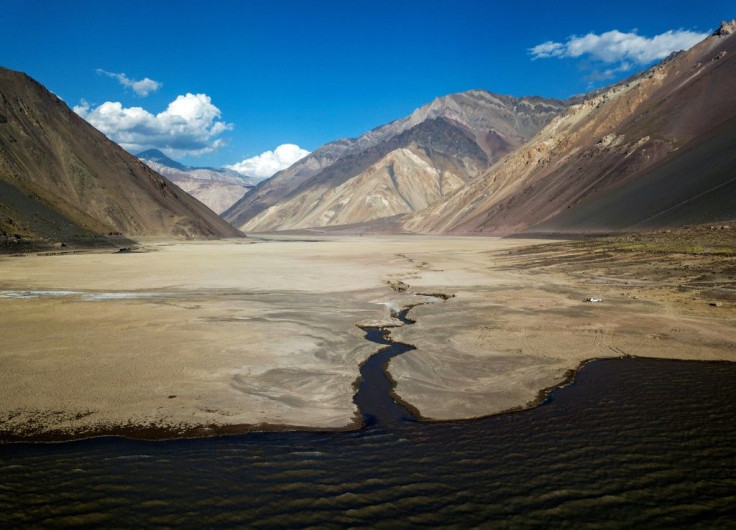Chile Drought Causing Water Shortage Amidst Virus Crisis

With historically low river flows and reservoirs running dry due to drought, people in central Chile have found themselves particularly vulnerable to the coronavirus pandemic.
Years of resource exploitation and lax legislation have allowed most reservoirs in that part of the country to run dry.
"There are now 400,000 families, nearly 1.5 million people approximately, whose supply of 50 liters of water a day depends on tankers," Rodrigo Mundaca, spokesman for the Movement for the Defense of Water, the Earth and the Protection of the Environment, told AFP.
One of the main pieces of advice to protect people against coronavirus is to wash your hands regularly.
"Living without water is awful," said Dilma Castillo, who lives with her children on one of the hills around El Melon, a town of 22,000 close to the seaside resort of Valparaiso whose river has dried up.
"The worst thing is that there's no awareness, even among the people here. I'm very distressed because it's humiliating to live in these conditions."
In the greater Santiago area and in Valparaiso, rainfall last year was almost 80 percent below the previous record low. In the northern region of Coquimbo it was down 90 percent.
Water tankers serve many homes, whose inhabitants come out to fill drums.
The virus pandemic is highlighting "once more that where there is a model of the private appropriation of water ... this condition does not guarantee people's human right to water and further weakens communities," said Mundaca.
Chilean law states that water is a resource for public use, but it turned over almost the entirety of the right to exploit the resource to the private sector.

In the Penuelas lake, an hour from Santiago, much of its bed appears cracked by the sun.
"I've been coming here to fish for 20 years. At first we used to catch a lot ... now we don't catch anything," Tomas Ruiz told AFP from the banks of what was left of the lake.
Matias Asun, the director of Greenpeace-Chile, said this week that the government of President Sebastian Pinera must "guarantee that there are no second-class citizens without the basics to protect themselves from COVID-19."

"Having soap is useless if there's not enough water to wash with it," he said.
Chile has reported more than 3,700 coronavirus cases and 22 deaths.
Private exploitation of water wasn't a problem in times of abundance, as was the case until recently.
But the drought has brought a furious reaction from communities that have run out of water in a country that saw an outbreak of social unrest in October that only subsided when social distancing measures were imposed.
Around 100 residents of El Melon occupied a well managed by the Anglo-American mining company, one of many multinationals exploiting Chile's vast copper reserves.
The occupiers are demanding that the well be used to provide water to people living in the region rather than for mining activity, said Fabian Villarroel, 26, one of the activists.
Anglo-American sent a statement to AFP saying it was committed to the well-being of people living near its sites and was collaborating in the search for "solutions that allow for inhabitants in the area to rely on a permanent supply of potable water."
"The 1981 water code separates the ownership of water from the dominion of the land," said Mundaca.
In Chile, "water is bought, sold or leased."
The general director of Waters, Oscar Cristi, says the water rights have been delivered to private companies, but the state controls those rights and can limit the amount of water kept in reservoirs.
However, the state has never exercised that right and if it did, it would have to compensate the private firms affected.
"The problem has to do with how those rights are distributed and what conditions are imposed," said Andrei Jouravlev, a member of the Economic Commission for Latin America and the Caribbean.
© Copyright AFP 2024. All rights reserved.




















